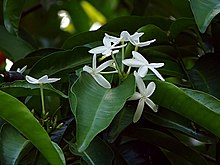| Kopsia arborea | |
|---|---|

| |

| |
| Conservation status | |
 Least Concern (IUCN 3.1) | |
| Scientific classification | |
| Kingdom: | Plantae |
| Clade: | Tracheophytes |
| Clade: | Angiosperms |
| Clade: | Eudicots |
| Clade: | Asterids |
| Order: | Gentianales |
| Family: | Apocynaceae |
| Genus: | Kopsia |
| Species: | K. arborea |
| Binomial name | |
| Kopsia arborea Blume | |
| Synonyms | |
Kopsia arborea is a tree in the family Apocynaceae.
Description
Kopsia arborea grows up to 14 metres (50 ft) tall, with a trunk diameter of up to 10 centimetres (4 in). The bark is grey. Its flowers feature a white corolla. The fruits are blue-black, ellipsoid or roundish, up to 4.2 cm (2 in) long. In China, local traditional medicinal uses include as an enema and as a treatment for tonsilitis.
Distribution and habitat
Kopsia arborea is native to China, Thailand, Vietnam, Malesia and Australia. It is found in a variety of habitats from sea level to 1,500 metres (5,000 ft) altitude.
References
 Media related to Kopsia arborea at Wikimedia Commons
Media related to Kopsia arborea at Wikimedia Commons Data related to Kopsia arborea at Wikispecies
Data related to Kopsia arborea at Wikispecies
- ^ Yu, S.-X.; Qin, h.; Botanic Gardens Conservation International (BGCI).; IUCN SSC Global Tree Specialist Group (2019). "Kopsia arborea". IUCN Red List of Threatened Species. 2019: e.T147643327A147643329. doi:10.2305/IUCN.UK.2019-2.RLTS.T147643327A147643329.en. Retrieved 20 November 2021.
- ^ "Kopsia arborea". Plants of the World Online. Royal Botanic Gardens, Kew. Retrieved 24 August 2020.
- ^ Middleton, David J. (September 2004). "Kopsia arborea Blume". In Soepadmo, E.; Saw, L. G.; Chung, R. C. K. (eds.). Tree Flora of Sabah and Sarawak. Vol. 5. Forest Research Institute Malaysia. p. 37. ISBN 983-2181-59-3. Archived from the original (PDF) on 27 September 2013. Retrieved 7 August 2013.
- "Kopsia arborea". eFloras. Retrieved 7 August 2013.
- F.A.Zich; B.P.M.Hyland; T.Whiffen; R.A.Kerrigan (2020). "Kopsia arborea". Australian Tropical Rainforest Plants (RFK). Centre for Australian National Biodiversity Research (CANBR), Australian Government. Retrieved 1 June 2021.
This Apocynaceae article is a stub. You can help Misplaced Pages by expanding it. |